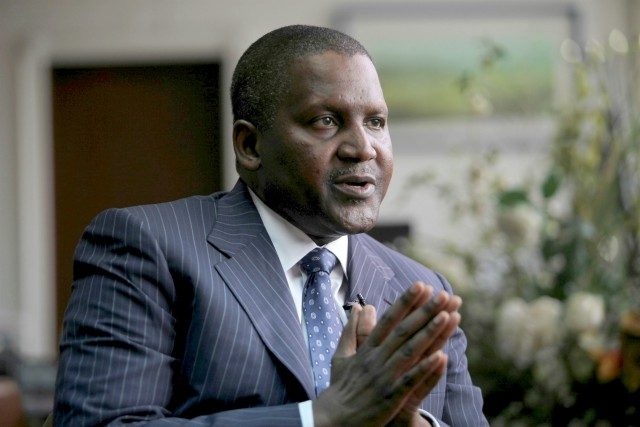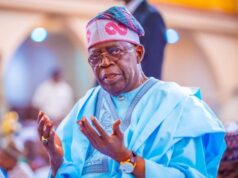Africa’s richest man and President of Dangote Group, Alhaji Aliko Dangote, has raised alarm over what he described as deliberate attempts by “mafias” in the petroleum sector to frustrate the operations of his multibillion-dollar refinery.
Dangote, speaking in Lagos on Monday after officially flagging off compressed natural gas (CNG)-powered trucks for direct fuel distribution, likened the current resistance to what happened in Nigeria’s once-thriving textile industry, which was eventually destroyed by vested interests.
The industrialist revealed that the first year of petrol production had been extremely challenging due to intense opposition from entrenched interest groups in the downstream sector.
“The past year has been a very rough journey, I must confess. It wasn’t easy because we came in to change the narratives. We came in to change the system of how things have been done in the downstream.
We have people who are used to rent collection. We have people who believe we have taken food from their tables,” Dangote said.
He alleged that both international traders and local marketers have colluded to undermine local refining, preferring instead to profit from importation. “The international traders and the local marketers all connive to suffocate any refinery,” he warned.
His remarks come against the backdrop of ongoing disputes between the refinery and major trade groups such as the Nigerian Union of Petroleum and Natural Gas Workers and the Depot and Petroleum Product Marketers Association of Nigeria.
NUPENG recently shut down depots over claims that the refinery barred its drivers from joining the union. DAPPMAN, on its part, accused the refinery of distorting the market by selling petrol to international traders at N65 cheaper than the rate offered to domestic buyers.
Dangote dismissed the claims, insisting that the refinery was forced to adjust its export pricing in order to survive. “Sometimes we export a little bit cheaper than what we sell domestically, not because we want to, but because we were being suffocated. We are charged premiums on crude, competing with subsidised Russian products, and the only way to keep the refinery running was to sell at lower margins,” he explained.
According to him, petrol remains relatively cheaper in Nigeria because the refinery is deliberately making sacrifices under the naira-for-crude arrangement. “People don’t know that we’re actually sacrificing a lot because the crude we buy through the naira-for-crude deal cannot be exported. We are required to process it and supply locally. At a point, we were even paying a $6 premium to Brent when Russian crude was going for $20,” he disclosed.
He added that 85 per cent of petrol consumed in neighbouring Benin Republic is smuggled across the border from Nigeria, a practice that further complicates the downstream environment.
Rejecting claims that his facility lacks capacity, Dangote revealed that the refinery exported 1.6 billion litres of petrol between June and August alone. “DAPPMAN said we don’t have the capacity. If that’s the case, then how are we exporting this volume? The dumping process is massive, and it is similar to how they destroyed textiles. But we will not allow them to kill this $20bn investment,” he vowed.
Dangote also reaffirmed that his refinery could meet Nigeria’s petrol needs while creating jobs. He announced that the newly deployed trucks alone would create about 24,000 jobs, with drivers earning three times the national minimum wage.
CNG-powered trucks
Amid the challenges, Dangote pressed ahead with efforts to control distribution and logistics by unveiling a new fleet of CNG-powered trucks designed to transport fuel directly to filling stations.
Dangote Group’s spokesman, Anthony Chiejina, told journalists that over 1,000 trucks were already available for fuel evacuation, with 500 more expected from the port. The move, he said, marked a complete transformation of the refinery’s distribution system within a year of commencing petrol production.
“In one year, we have transitioned to CNG. Some of the old trucks were not even safe by global standards. The CNG trucks are modern, efficient, and safer. We already have more than 1,000 on ground, 500 at the port, and by the end of the month, all will be delivered. That’s a major transformation,” Chiejina said.
The CNG initiative was initially scheduled for launch on August 15 but was delayed due to logistics issues in China. The group had ordered 4,000 trucks from China, but shipping bottlenecks slowed their arrival in Nigeria.
A senior official of the Dangote Group disclosed that consignments of trucks were now arriving in batches every week. “The trucks are arriving in hundreds every week,” the official confirmed.
Despite the battles with unions, marketers, and shadowy “mafias,” Dangote maintained that the refinery would not be derailed. He noted that his investments had already ended decades of persistent fuel scarcity in Nigeria and pledged to resist attempts to undermine the project.
“I will not allow anyone to kill this $20bn refinery. It has brought pride to Nigeria and Africa, and it will remain a pillar of energy security for our people,” he declared.
With a combination of increased refining capacity, direct distribution using CNG-powered trucks, and a vow to withstand cartel pressures, Dangote is positioning his refinery as a central player in Nigeria’s petroleum landscape—despite the strong resistance it continues to face.
Credit: punchng.com










































































